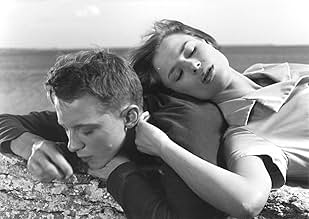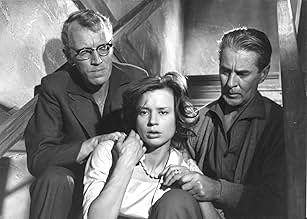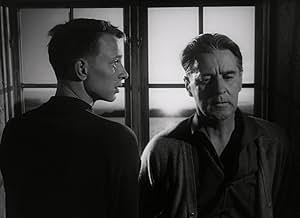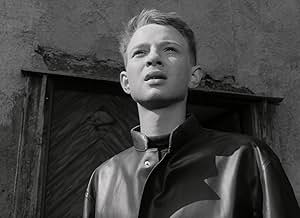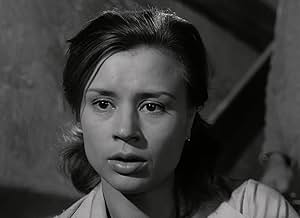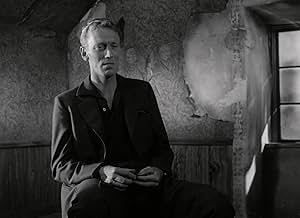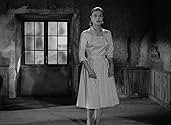IMDb-BEWERTUNG
7,9/10
28.720
IHRE BEWERTUNG
Kürzlich wurde Karin aus einer psychiatrischen Klinik entlassen; nun kehrt sie auf eine Insel in das Haus ihrer entfremdeten Familie zurück, wo sie erneut der Wirklichkeit entflieht, als sie... Alles lesenKürzlich wurde Karin aus einer psychiatrischen Klinik entlassen; nun kehrt sie auf eine Insel in das Haus ihrer entfremdeten Familie zurück, wo sie erneut der Wirklichkeit entflieht, als sie glaubt, Besuche von Gott zu erhalten.Kürzlich wurde Karin aus einer psychiatrischen Klinik entlassen; nun kehrt sie auf eine Insel in das Haus ihrer entfremdeten Familie zurück, wo sie erneut der Wirklichkeit entflieht, als sie glaubt, Besuche von Gott zu erhalten.
- Regie
- Drehbuch
- Hauptbesetzung
- 1 Oscar gewonnen
- 3 Gewinne & 5 Nominierungen insgesamt
Empfohlene Bewertungen
Harriet Anderson's performance is beyond brilliance. She has a very difficult role, but there seems not the hint of acting on her part. It is a role where the character seems to be acting and is having a very rough time. Her performance is transparent and haunting. I saw this film most recently a few years ago (and have seen many movies since then), but i still recall vividly three of her scenes. The photography is magical and while not as praised as Wild Strawberries, Persona or Winter Light ( and a few other Bergman classics), its power and its passion reach inside your soul and dares you to resist living the story and the characters of the film. Also, Max von Sydow is brilliant as usual--he is certainly the most underrated actor of all time--theater, television or cinema. I highly recommend this film and then your viewing t he 1971 Passion of Anna, also with Max v.S. and a performance by Liv Ullmann that rivals Harriet's in Thtorug a Glass Darkly. The theme of Darkly is the human predicament in a world of suffering and illness. How does man survive if he actually "lives" his/her life, rather than just sports through life without any experience of art and the spiritual (good or bad). This film is part of a loose trilogy that includes the magnificent Winter Light and The Silence, though each can be viewed separately with no loss of discovery and enjoyment. When I was in college at UCLA from 1968-75 (under and grad school), Bergman was the rage with many people. He seems to be lost in the mists of time. But if go back and watch his films from the late 50's to the 70's, you will see cinema at its boldest and its greatest. Buy the films or rent them (Netflix has a good collection.). Darkly will shake your world and cause ripples of thought and feelings that move for a long, long time inside your mind, and if your fortunate your soul.. See this film.
This film's title is taken from the Bible: "For now we see through a glass, darkly; but then face to face: now I know in part; but then shall I know even as also I am known." (1 Cor 13:12).
The film is a major work of cinema and a major work of Bergman. If one looks at the body of Bergman's films he was probably approaching his peak of artistry, which he would achieve in his next work "Winter light", a film that Bergman himself called perfect. The reason most viewers do not grasp the importance of the magnificent "Man-God trilogy" or "the Silence trilogy" or "the Dark/Faith trilogy" (three films: "Through a glass darkly", "Winter light", and "the Silence") is that the trilogy deals with the theological question of God's existence. It is essentially a thinking person's film. If you can reflect on what you see, these three films are a treasurea treasure that influenced major directors several decades later, specifically Kieslowski who made "Three Colors: Blue" also almost entirely based on 1 Corinthians Chapter 13, Tarkovsky who seems to have borrowed some ideas like the sudden baptismal rain from this film that he employs in "Solyaris" and "Stalker" and finally the exciting new talent from Russia Andrei Zvyagintsev (director of "The Return", also taking a leaf from the Bergmanesque sonfather relationship). All these films seem to have been influenced by this seminal work of Bergman.
To those viewers, who are not spiritually inclined, the film could be reduced to the obvious action of Harriet Anderson's character Karin insisting on wearing goggles as she steps out of her home to live the rest of her life in a hospital. It could easily be interpreted as a study of mental illness, a film that gives credence to the theory that god does not exist. The film can equally be interpreted as a film on mad people who feel they are in communion with god, who at other times are slaves to dark forces (voices).
On the other hand one can argue the intensity of the light is a metaphor for a sign that God existsthe basic question that troubled Bergman, the son of a priest, in real life. Even the young Minus kneels down to pray to God as the rain (baptismal?) falls suddenly. A keen viewer will note that there is no sign of rain on island or of rain drenching men in an open boat soon after the event. Only Karin's hair is wet. All three films seek an answer that God exists from a silent, "inscrutable" (to quote a word from this film) God to whom millions pray. "Through a glass darkly" opens with a shot of the almost still, dark waters of the sea mirroring the sky. The film ends with several references of light. For the cynical, Bergman was disillusioned and felt that God was a "spider" (the intriguing image for the DVD covers of the three films), a reference to Karin's outburst towards the end of the film. If Bergman, was truly disillusioned, would he have added the final epilogue where the father tells his son "God exists in love, in every sort of love, maybe God is love." These last words make the son say my father has "talked to me" the penultimate words of the filma seemingly spiritual response even Jesus on the cross wanted ("Father, father, why hast thou forgotten me?") before he died.
It would be ridiculous to see this work merely as a film seeking answers to God's existence. Like "Three colors: Blue", this is a film on love. There is the undiluted love of an atheist husband (shades of Bergman?) for his ailing wife (note the film is dedicated to Kabi, Bergman's wife at a point when divorce was looming large). There is love of a father for his daughter, son and son-in-law triggered by a failed suicide attempt (only recalled in the film). There is love between siblings.
The film is also about marriage. Visually, the film emphasizes the wedding ring in the scenes involving husband (the camera captures the wedding ring on the finger several times) and wife (she puts it on after she washes her face). The son asks with an innocent cockiness of the father who has recently divorced his second wife Marianne (never shown on screen) if "he has lost all stability, spiritually"? Structurally Bergman doffs his cap to Shakespeare by adding a one act play within the film on the lines of "Hamlet" to drive home a point to the father and his illusion of love for his perfect work of art at the expense of depriving love for his near and dear.
In more ways than one, this is a thinking person's film. After viewing the film several times, one is in awe of this filmmaker so prolific, so perfect and so sensitive. What he has written for cinema can be compared to the output of great writers like Tolstoy and Shakespeare. He was truly a genius. I do agree with Bergman when he avers that the three films in the trilogy are not connected and are stand alone films. The only common link among the three films is Bergman's personal quest for a response from a silent God that his father believed in and in whom Bergman was brought up to believe in. These are not films of an atheist but works from a genius "flirting with God" to quote from the film itself.
Many years after he made the film, Bergman was uncomfortable with the final scene. The doubting Thomas in Bergman had resurfaced. Yet he never reworked on the film. The film has much to offer for a student of cinema: it is made of fine photography, art direction, acting, scriptwriting, editing and sound (Bach plus the horn of the lighthouse). Undoubtedly one of Bergman's finest works, it anticipates the perfect "Winter light," the next film that Bergman wrote and directed.
The film is a major work of cinema and a major work of Bergman. If one looks at the body of Bergman's films he was probably approaching his peak of artistry, which he would achieve in his next work "Winter light", a film that Bergman himself called perfect. The reason most viewers do not grasp the importance of the magnificent "Man-God trilogy" or "the Silence trilogy" or "the Dark/Faith trilogy" (three films: "Through a glass darkly", "Winter light", and "the Silence") is that the trilogy deals with the theological question of God's existence. It is essentially a thinking person's film. If you can reflect on what you see, these three films are a treasurea treasure that influenced major directors several decades later, specifically Kieslowski who made "Three Colors: Blue" also almost entirely based on 1 Corinthians Chapter 13, Tarkovsky who seems to have borrowed some ideas like the sudden baptismal rain from this film that he employs in "Solyaris" and "Stalker" and finally the exciting new talent from Russia Andrei Zvyagintsev (director of "The Return", also taking a leaf from the Bergmanesque sonfather relationship). All these films seem to have been influenced by this seminal work of Bergman.
To those viewers, who are not spiritually inclined, the film could be reduced to the obvious action of Harriet Anderson's character Karin insisting on wearing goggles as she steps out of her home to live the rest of her life in a hospital. It could easily be interpreted as a study of mental illness, a film that gives credence to the theory that god does not exist. The film can equally be interpreted as a film on mad people who feel they are in communion with god, who at other times are slaves to dark forces (voices).
On the other hand one can argue the intensity of the light is a metaphor for a sign that God existsthe basic question that troubled Bergman, the son of a priest, in real life. Even the young Minus kneels down to pray to God as the rain (baptismal?) falls suddenly. A keen viewer will note that there is no sign of rain on island or of rain drenching men in an open boat soon after the event. Only Karin's hair is wet. All three films seek an answer that God exists from a silent, "inscrutable" (to quote a word from this film) God to whom millions pray. "Through a glass darkly" opens with a shot of the almost still, dark waters of the sea mirroring the sky. The film ends with several references of light. For the cynical, Bergman was disillusioned and felt that God was a "spider" (the intriguing image for the DVD covers of the three films), a reference to Karin's outburst towards the end of the film. If Bergman, was truly disillusioned, would he have added the final epilogue where the father tells his son "God exists in love, in every sort of love, maybe God is love." These last words make the son say my father has "talked to me" the penultimate words of the filma seemingly spiritual response even Jesus on the cross wanted ("Father, father, why hast thou forgotten me?") before he died.
It would be ridiculous to see this work merely as a film seeking answers to God's existence. Like "Three colors: Blue", this is a film on love. There is the undiluted love of an atheist husband (shades of Bergman?) for his ailing wife (note the film is dedicated to Kabi, Bergman's wife at a point when divorce was looming large). There is love of a father for his daughter, son and son-in-law triggered by a failed suicide attempt (only recalled in the film). There is love between siblings.
The film is also about marriage. Visually, the film emphasizes the wedding ring in the scenes involving husband (the camera captures the wedding ring on the finger several times) and wife (she puts it on after she washes her face). The son asks with an innocent cockiness of the father who has recently divorced his second wife Marianne (never shown on screen) if "he has lost all stability, spiritually"? Structurally Bergman doffs his cap to Shakespeare by adding a one act play within the film on the lines of "Hamlet" to drive home a point to the father and his illusion of love for his perfect work of art at the expense of depriving love for his near and dear.
In more ways than one, this is a thinking person's film. After viewing the film several times, one is in awe of this filmmaker so prolific, so perfect and so sensitive. What he has written for cinema can be compared to the output of great writers like Tolstoy and Shakespeare. He was truly a genius. I do agree with Bergman when he avers that the three films in the trilogy are not connected and are stand alone films. The only common link among the three films is Bergman's personal quest for a response from a silent God that his father believed in and in whom Bergman was brought up to believe in. These are not films of an atheist but works from a genius "flirting with God" to quote from the film itself.
Many years after he made the film, Bergman was uncomfortable with the final scene. The doubting Thomas in Bergman had resurfaced. Yet he never reworked on the film. The film has much to offer for a student of cinema: it is made of fine photography, art direction, acting, scriptwriting, editing and sound (Bach plus the horn of the lighthouse). Undoubtedly one of Bergman's finest works, it anticipates the perfect "Winter light," the next film that Bergman wrote and directed.
Her eyes could not deceive what her mind made her believe, though to others she's disturbed and increasingly perturbed, as a cocktail of delusion, creates confusion and illusion, and there's nothing they can do, except observe as she looks through.
There are outstanding performances and there are Harriet Andersson performances and there is a difference between the two, especially under the guidance of this director, as she takes you on the nightmare that Karin lives, the struggles she endures (and of those that surround her), as her world cascades through torment and torture that she can do very little about, and at the time nobody else could be of much help either.
There are outstanding performances and there are Harriet Andersson performances and there is a difference between the two, especially under the guidance of this director, as she takes you on the nightmare that Karin lives, the struggles she endures (and of those that surround her), as her world cascades through torment and torture that she can do very little about, and at the time nobody else could be of much help either.
Between 1957-1963, Ingmar Bergman directed seven films. In my mind, there has never been such an amazingly creative period for a director as the six years between Wild Strawberries and The Silence. Through a Glass Darkly stands out to me as not only the masterpiece of this era, but of Bergman's entire career. This film has such a distinct atmosphere, which conveys not only isolation and melancholy, but also dark, austere beauty. Every little piece of this film fits together like a glorious completed puzzle. The Bach playing over the opening credits. The cinematography, with long, meditative shots in glowing black and white. The performances turned in by Harriet Andersson, Gunner Bjornstrand, and Bergman regular Max von Sydow. Overall, I sense that Bergman's vision is so obviously being displayed on the screen, as if his soul is being laid bare. As a singular piece of art, it is just staggering to behold. I think that everyone has albums or films that they connect with certain periods in their life, that transcend the mundane and just touch you in a profound way. Through a Glass Darkly is one for me. A must see.
This was the first Bergman movie I ever watched. Consequently, it holds sort of a special place in my catalogue of movie memories.
I enjoyed the depiction of the numerous relationships between people or objects which were kept apart by walls or a "dark glass." The artist and the fullness of what he/she is attempting to depict, mankind and God, and more particularly in the film, between Minus and women, Minus and David, etc..
The most gripping, however, were the relationship between David and Karin, and between Karin and "God." I'm not going to get into detail for the sake of those who haven't seen the film. But Bjornstrand's line about the "magic circle" we draw around ourselves instantly vaulted close to the top of my list of movie lines which have impacted me.
Lastly, I appreciated how the von Sydow character, Martin, acted as a representation of what love is not, i.e. his desire to always do the right thing, rather than the honest thing.
I enjoyed the depiction of the numerous relationships between people or objects which were kept apart by walls or a "dark glass." The artist and the fullness of what he/she is attempting to depict, mankind and God, and more particularly in the film, between Minus and women, Minus and David, etc..
The most gripping, however, were the relationship between David and Karin, and between Karin and "God." I'm not going to get into detail for the sake of those who haven't seen the film. But Bjornstrand's line about the "magic circle" we draw around ourselves instantly vaulted close to the top of my list of movie lines which have impacted me.
Lastly, I appreciated how the von Sydow character, Martin, acted as a representation of what love is not, i.e. his desire to always do the right thing, rather than the honest thing.
Wusstest du schon
- WissenswertesThe first Ingmar Bergman film to be made on the island of Fårö. Bergman would later buy a home on the island.
- PatzerAs Minus paints the chair, the amount of paint on the chair changes between shots.
- Crazy CreditsThere are no end credits. After Minus (Lars Passgård) says the final line, the film fades to black and ends. The entire cast and crew were credited at the start, and there isn't even a "Fin" or "Ende".
- VerbindungenFeatured in Reel Radicals: The Sixties Revolution in Film (2002)
- SoundtracksSarabande from Suite No. 2 in D minor for Violoncello
Written by Johann Sebastian Bach
Performed by Blondal Bengston.
Top-Auswahl
Melde dich zum Bewerten an und greife auf die Watchlist für personalisierte Empfehlungen zu.
- How long is Through a Glass Darkly?Powered by Alexa
Details
Box Office
- Weltweiter Bruttoertrag
- 8.939 $
- Laufzeit
- 1 Std. 30 Min.(90 min)
- Farbe
- Sound-Mix
- Seitenverhältnis
- 1.37 : 1
Zu dieser Seite beitragen
Bearbeitung vorschlagen oder fehlenden Inhalt hinzufügen


